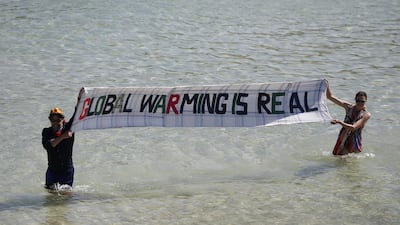Britain needs to take immediate action in eight key areas within the next two years to protect the country from the worst effects of climate change, the government’s advisory body said on Wednesday.
The UK's Climate Change Committee said urgent work was needed to protect the country's wildlife, its trading links and power supply as sharply rising temperatures threaten lives and livelihoods in the coming decades.
The panel warned that Britain was not adapting fast enough to the impact of global warming and said that the government had failed to heed previous warnings, despite hosting forthcoming key climate change talks in November.
The Cop26 conference in Glasgow, Scotland, will seek renewed global commitments to prevent a catastrophic rise in the world's temperature but the report states that Britain is not doing enough.
The CCC said the average land temperature in Britain had risen by about 1.2°C from pre-industrial levels and sea levels had risen by 16 centimetres since 1900.
Episodes of extreme heat were becoming more frequent, it said in its latest report, warning that further delay in taking action to mitigate these risks would lead to higher costs.
Key areas of action include dealing with climate-related failures of the power system as the UK becomes increasingly reliant on electricity as it switches to electric vehicles and low carbon heating.
About 15 to 20 per cent of the country's energy is electric but that is expected to rise to 65 per cent.
The report warned that floods and storms, which are likely to become increasingly common, would affect transport and communications.
It said solutions could include measures such as urging people to charge their cars ahead of bad weather to ensure they have appropriate transport, or use the batteries to power homes in a blackout.
It called for action to reduce pollution, grow more trees to create shade for rivers and remove material that increases the probability of bush fires.
Climate was high on the agenda of last weekend's G7 summit, where UK Prime Minister Boris Johnson promised a "green industrial revolution" to meet environmental challenges and create jobs after the coronavirus pandemic.
The CCC, an independent body formed under Britain's Climate Change Act to advise the government on global warming, said preparations for changes brought about by global warming were crucial.
"New evidence shows that the gap between the level of risk we face and the level of adaptation under way has widened," it said in a 1,500-page report.
"Adaptation action has failed to keep pace with the worsening reality of climate risk."
Panel member Julia King said: "The severity of the risks we face must not be underestimated."
She said the risks would not disappear as the world moved towards net-zero carbon emissions. "Many of them are already locked in," she said.
Greenpeace
"Much better" government action to mitigate climate-enforced changes was needed, the CCC said, because of a failure to implement its earlier advice and to provide proper funding.
"This needs to change," the committee said.
Greenpeace said the report showed that "despite the claims of climate leadership, it's clear yet again that the government is falling behind".
"It's time the government pulls its finger out to ensure we're ready to face the challenges the climate crises poses," said Doug Parr, policy director at Greenpeace UK.
Cop26 is billed as the most important climate change conference since 2015, when countries pledged to limit global temperature rises to less than 2°C above pre-industrial levels, and aim for 1.5°C.
Experts believe this can be achieved only by the world reaching net-zero carbon emissions by 2050, a goal reaffirmed by the G7 on Sunday.
The world's richest nations agreed to halve collective emissions by 2030 from the level in 2010.
But the advisory committee said increasing warming was "inevitable, even on the most ambitious pathways for the reduction of global greenhouse gas emissions".


